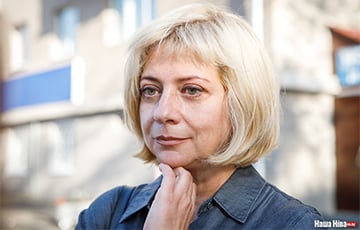Lukashenka, Listen To 'Valenki'
28- 4.08.2023, 11:40
- 34,502

PHOTO: NASHA NIVA
This music will last forever.
Young singer Patricia Svitina was awarded a scholarship by Lukashenka as a representative of talented young people. In 2020, she publicly refused the scholarship. She said she couldn't accept it from a government that was destroying her people. The talented girl, who sings folklore songs, collects songs lovingly and is most afraid of the disappearance of folklore and tradition in our country, was arrested in May and only released yesterday, sentenced to "house arrest".
The young and talented singer Meriem Gerasimenko was sentenced to the same "house arrest" a little earlier. A year ago she sang the song "Obiimi" by Okean Elzy on Zybytskaya Street near the Banki-Butylki bar. The girl spent six months singing in Volodarka. At the same time, the owner of the ill-fated bar, Andrei Zhuk, and his wife were arrested. They were also held in pre-trial detention for six months. The bar no longer works. There is no one to sing there.
The drummer Alexei Sanchuk is serving a six-year sentence for organising mass disorder. When he was arrested, they did their best to force him to repent publicly on television. But the only thing he said, through clenched teeth, was "I was learning the rhythm". The drummer's perfect, mathematically precise answer. He was not only teaching, he was helping the pipers and guitarists to keep the rhythm for the march of thousands and not be afraid. How can it be scary where music plays?
In September the trial of Tor band musicians Dzmitry Halavach, Yauhen Burlo and Andrei Yaremchyk is due to begin. It was recently announced that they face up to 12 years in prison. The musicians were arrested last October. Their musical instruments are also being held. They were taken away in separate vehicles.
The musicians from the band Litesound were detained with their parents. DJ Alexander Bogdanov suffered three broken ribs and a ruptured spleen during his sets at the protests and was held in pre-trial detention for several months. The musicians of Irdorath and their friends were arrested using the classic 'mask show', and only recently were Nadezhda and Uladzimir Kalach, husband and wife, leaders of the band, able to embrace after two years in the colony and flee the country together. Now they are trying to recover both mentally and physically, and to find a way to get new instruments. The police are like magpies, carrying everything that shines: drums, guitars, bagpipes, tambourines, not to mention brass wind instruments that shine like gold. It's beautiful, so it might come in handy. And if not, they could be melted down into plaques for belts.
Pavel Arakelyan, Aliaksandr Pamidorau, Ales Tabolich and Ihar Bantser, who served time for "criminal offences" and some for "administrative offences", are also worthy of mention. So many names, articles of the criminal code, mutilated bodies and souls, stolen instruments, that one can only conclude that the authorities do not like music, unless it is the music of Leps and Baskov. But even if we assume that a song, as a combination of notes and words, can be dangerous to the usurper - both Tsoi and the Tor Band in Belarus proved to be explosive with their lyrics, if songs in Ukrainian can theoretically annoy Putin walking under the windows of Minsk or Brest - what does this have to do with Arakelyan, who doesn't say any words, just blows a tune (it's Arakelyan himself who calls his saxophones tune, so don't blame me for vulgar formulations)? Or the drummer Sanchuk, who taught rhythm? Where does this hatred of any form of music that isn't on television come from? There are only seven notes.
And it's simple. Lukashenka is the same character from the Soviet anecdote Ivan Petrovich Sidorov, who wrote letters to the radio demanding that his favourite song "Valenki" be broadcast. First it was a noble combine harvester Ivan Petrovich, then an instructor from the district committee Ivan Petrovich, then a deputy from the regional council. And the radio was happy to comply and broadcast "Valenki". And so on for many years.
And then comes a letter from Ivan Petrovich Sidorov, a member of the Politburo of the CPSU Central Committee, asking to broadcast Johann Sebastian Bach's Toccata and Fugue in D Minor. And the radio, after reading the request, replies: "Ivan Petrovich, don't show off. Listen to your favourite song "Valenki".
So, Aliaksandr Ryhoravich, don't show off. Release the musicians and listen to your "Valenki" around the clock.
Iryna Khalip, especially for Charter97.org











